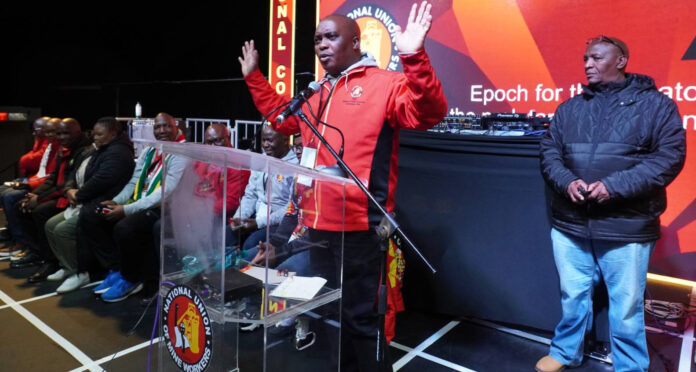The ANC has lost a powerful ally in the National Union of Mineworkers (NUM), which decided not to campaign for the governing party in the upcoming 2026 local elections.
This move is a big deal as the NUM has always stood by the ANC’s side, helping it win votes for many years.
Even though the union isn’t telling its members to vote against the ANC, not supporting it is a blow to the party.
But the move is also a setback for the SACP, which a month ago seemed to enjoy full backing of the union.
NUM president Phillip Vilakazi told Sunday World that the current political environment has changed dramatically, forcing the union to reconsider its role.
He said that internal divisions, mistrust, and a failure of leadership has caused many within the union to question whether political alignment is still appropriate.
He highlighted that people have their personal choices to make when it comes to voting, despite them being politically affiliated to the ANC.
“At some point, people are going to take a resolution, and they are going to sit back and say, ‘We are not going to vote because we don’t see why we must vote.’
“We have reached that stage, but until we see that there is a problem in the house, we need to sit back and work together, or it’s not going to get better,” said Vilakazi.
Vilakazi explained that the NUM was originally formed to protect workers’ rights, especially in mining and construction, where black workers were exploited under apartheid.
He also stressed the union’s inclusive values.
“NUM is a non-racial, non-discriminatory organisation to the point that it doesn’t matter which organisation an employee affiliates with in their political choices; that includes their religion,” he said.
Looking back at the union’s role during the anti-apartheid struggle, Vilakazi said NUM had once worked with like-minded organisations in the pursuit of dignity and equality for black South Africans. However, he noted that the current political climate has shifted significantly.
He said capitalism had created deep divisions within society and among former allies.
“That revolution continued to the point where like-minded people and like-minded organisations managed to break the chains of apartheid.
“Now, we are in a situation where capitalism has created mistrust and a misunderstanding as to who cares for whom,” he said.
According to Vilakazi, the effects of capitalism have led to a society where blame is shifted, unity is eroded, and the focus has turned to individual survival.
“The real point here is that capitalism has managed to divide society through crunching society into poverty, where the leftovers of apartheid, of which is the firstborn is capitalism, has now divided our comrades because it’s ‘every man for himself, not for us all’,” said Vilakazi.
He criticised political leaders for being entangled in internal conflicts and failing to deliver on promises, and misusing public funds.
Vilakazi said the ANC’s decline had been anticipated, especially as it adopted foreign policies that strayed from the party’s transformation agenda.
He added that those in power now appeared more concerned with living lavishly rather than ensuring that basic services reach struggling South Africans.
With this decision, the NUM has made it clear that it is prioritising its founding mission to protect workers’ rights above political loyalty, at a time when many believe the revolutionary spirit that once united organisations has been lost.
Matthew Parks, Cosatu spokesperson, said the trade union federation understood that the NUM would be backing the ANC in the 2026 local elections.
He said Cosatu is still discussing the SACP special national congress resolution to contest elections, and the issues of the upcoming elections.
He said a special central executive committee was called to talk about these issues, and more talks will take place at the central committee meeting in September.
After that, he said, the issue will be taken to the national congress next year, where a final decision will be made.
He added that affiliates are also holding similar talks and receiving input from their members and workers, which they will bring into Cosatu’s decision-making process.
“Ultimately, we want an alliance with the ANC and SACP that is renewed, reconfigured and on the ground and a federation that is united.
“These are complex and sensitive matters, hence extensive engagements are being held, in particular with workers,” said Parks.



